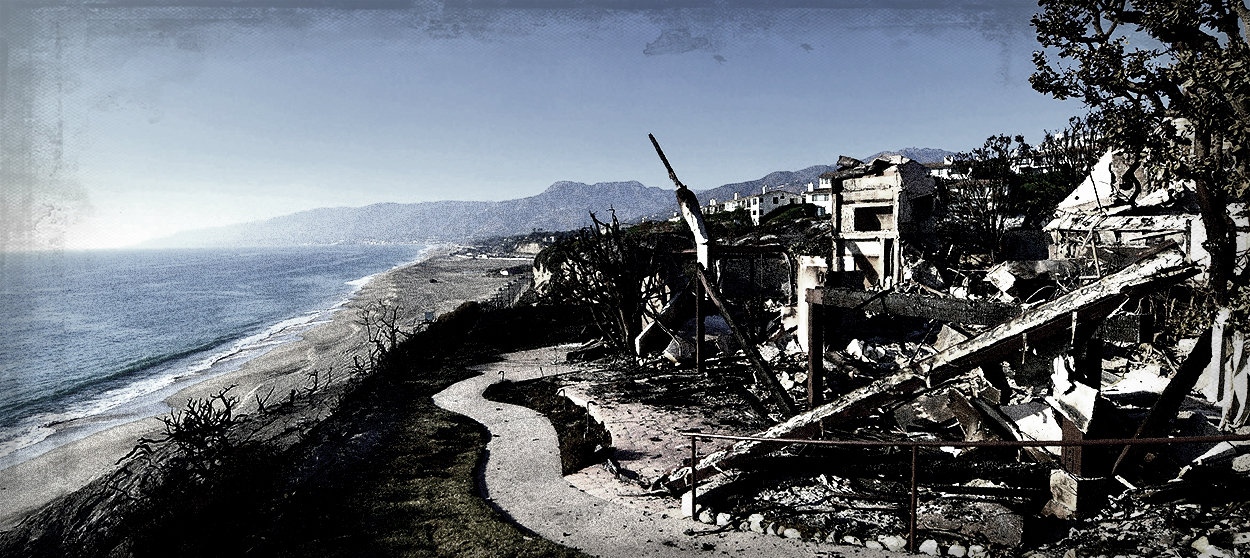Wealth cannot save you from climate change
Its powers are broad, indiscriminate, and inescapable


A free daily email with the biggest news stories of the day – and the best features from TheWeek.com
You are now subscribed
Your newsletter sign-up was successful
Money and power can protect you from many things in life. In some cases, they can even protect you from individual climate change-fueled natural disasters like the fires ravaging California. The Woolsey Fire in Southern California, for instance, burned down much of the wealthy city of Malibu — but not the home of Kanye West and Kim Kardashian, who hired private firefighters to save their $60 million home, and also those of everyone on their street. Many pointed to this as evidence for a popular argument that when it comes to climate change, wealthy people and countries will be able to basically escape the worst effects.
This is not the case. The dangers of climate change are broad and largely indiscriminate.
Now, it is certainly the case that the rich will be less vulnerable on average to climate disasters. With lots of money, one can buy special protective technology, hire expensive private guard labor, move to a different place, or simply rebuild one's property if it gets destroyed.
The Week
Escape your echo chamber. Get the facts behind the news, plus analysis from multiple perspectives.

Sign up for The Week's Free Newsletters
From our morning news briefing to a weekly Good News Newsletter, get the best of The Week delivered directly to your inbox.
From our morning news briefing to a weekly Good News Newsletter, get the best of The Week delivered directly to your inbox.
But that doesn't mean you will be invulnerable. Indeed, in this particular case the ultra-wealthy entertainment moguls in Malibu were a lot more vulnerable than working-class people in Los Angeles proper, because many of their sprawling mansions are built up on heavily wooded hillsides. Kanye and Kim just barely managed to save their home, but many other A-list wealthy celebrities lost theirs, including Miley Cyrus, Liam Hemsworth, Neil Young, and Gerard Butler.
Elsewhere, a Union of Concerned Scientists report estimated that by 2100, some $1 trillion in private coastal real estate will be at risk of chronic flooding due to sea level rise. It's a safe bet that the bulk of those properties are owned by the rich.
Other climate problems are literally impossible to segregate to just poorer communities. On Friday last week, Northern California's air was rated as the worst in the world from all the smoke. One might be able to buy a mask or an expensive home filter to compensate, but not only are those technologies not 100 percent effective, they are an inescapable degradation of quality of life. Nobody would choose walking around under a blood-red ashen sky with a respirator, or staying inside a hermetically sealed house changing the air filter every couple hours, over great lungfuls of clean air and blue skies.
The bedrock reality here is that wealth is a claim on the material resources that are still socially developed. Money gives you power over other people — the ability to buy goods and services that others work to create. If those other people are harmed badly enough, that wealth could easily evaporate into nothing.
A free daily email with the biggest news stories of the day – and the best features from TheWeek.com
Cash is useless without someone who will or can exchange it for something you want.
To wit: Jeff Bezos is the world's richest man, with a net worth of perhaps $130 billion, and most of his money comes from selling to a mass consumer market. That market requires a population with at least a modicum of purchasing power, reasonably functional public infrastructure to deliver its products, stable governance, and so forth. His company also gets direct public subsidy in the form of a sweetheart deal with the U.S. Postal Service, big defense contracts, and most recently, huge bribes from Virginia and New York to locate its new headquarters there.
If there were a very severe climate crisis that seriously disrupted the U.S. economy and government, Bezos' whole business could easily go bankrupt, and his wealth — which is mostly Amazon stock — would disappear.
Now, it may well be possible for rich people to build some sort of prepper fortress that would allow them to survive a climate cataclysm indefinitely. But this would mean losing most of their wealth, require careful advance planning, and be a lot more difficult than they probably suspect.
Wealth might just buy you a comforting blanket of denial — that even if everything goes horribly wrong in Bangladesh, surely wealthy Americans won't be allowed to suffer. Right up until the flames crest the ridge behind your house.
Ryan Cooper is a national correspondent at TheWeek.com. His work has appeared in the Washington Monthly, The New Republic, and the Washington Post.
